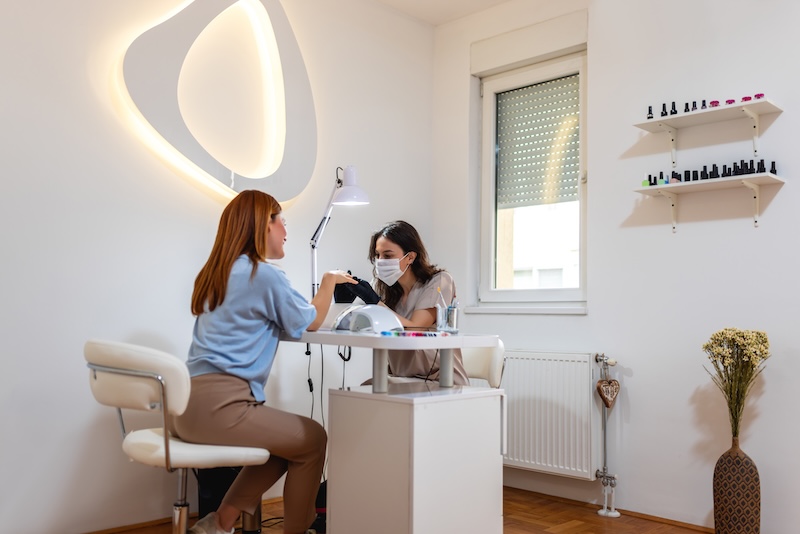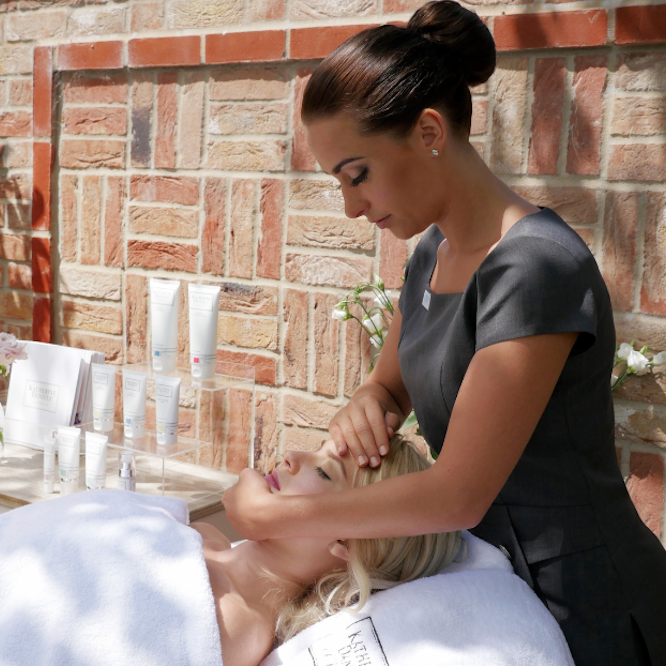Running a beauty business can take a toll on your mental health. Here’s how salon owners and therapists can manage stress, prevent burnout and support their team’s wellbeing
Running a beauty business is rewarding, but it can also be one of the most emotionally demanding jobs out there.
Between client care, staff management and daily operations, it’s easy to overlook your own wellbeing.
However, without mental balance, your energy, creativity and leadership can quickly decline, and so can your team’s morale.
Tammy Koslowski, founder of Naf! Salon in Glasgow, explains why mental health care must be part of every salon’s culture: “We work in the business of people – the services we provide are looking after people every day.
“They come to our space to feel good about themselves and take some time out for themselves, but it’s important for us as salon owners and employees to make sure we’re looking after ourselves so we can look after our clients without it feeling like a burden.”
What can happen when wellbeing slips
According to insights from Jobleads and Health Assured, neglecting your own or your team’s mental health can lead to four key issues:
1. Chronic stress and burnout
Constant strain can trigger muscle tension, headaches, fatigue and even lowered immunity. Long-term stress raises cortisol and narrows blood vessels, leading to physical health problems. Setting boundaries between work and rest, and learning to say no, is crucial.
2. Disrupted sleep quality
Ruminating about clients or finances at night can leave you drained. Sleep is vital for emotional regulation; without it, anxiety and low mood can worsen. Try digital detoxing before bed and a calming routine with meditation or breathing exercises.
3. Declining self-esteem
When work feels unrewarding, it can undermine confidence and increase feelings of inadequacy. Counter this by surrounding yourself with supportive peers, seeking feedback from mentors and celebrating small wins.
4. Unhealthy coping habits
Overwork can drive people towards unhealthy coping mechanisms like excessive drinking or overeating. Replacing these with structured breaks, exercise and mindfulness helps protect long-term health.

Why mental health support matters for your business
According to the Mental Health Foundation, around 15% of UK employees have a mental health condition, while Deloitte estimates poor mental wellbeing costs UK employers £51 billion a year in absenteeism, presenteeism and staff turnover.
Meanwhile, Health and Safety Executive (HSE) figures show that 875,000 UK workers suffered from work-related stress, depression or anxiety in 2022/23, resulting in 17.1 million lost working days.
And research from MHFA England found 63% of UK employees now report symptoms of burnout, including fatigue and disengagement.
These numbers show that good mental health isn’t just a personal priority, it’s also a business one.
Building mental wellness into your business
Here are actionable ways to create a mentally healthy salon culture:
- Schedule mental health check-ins: Short one-to-ones (5-10 minutes) give space for staff to open up.
- Offer rotation in physical roles: Prevent fatigue by alternating desk work with treatment time.
- Create “quiet zones” or pause breaks: A few minutes away from clients can reset the mind.
- Encourage training in mental health awareness: Having team members trained in spotting early signs can make all the difference.
- Regularly assess wellbeing: Anonymous surveys or quick polls help you track how your team feels.

Trusted UK mental health resources for beauty business owners and teams
Below is a curated, grouped directory of reliable mental health and wellbeing resources, including training, helplines and digital tools you can start using today.
1. Employer & workplace wellbeing toolkits
Mind & CIPD: Supporting Mental Health at Work
A practical guide for employers with policies, templates and wellbeing plans.
Read more on cipd.org
Solent Mind: Work and Mental Health Toolkit
Includes conversation guides, Wellness Action Plans and advice for managing stress in teams.
solentmind.org.uk
Mental Health at Work (by Mind)
A comprehensive hub for small business owners, featuring free resources, toolkits and training options.
mentalhealthatwork.org.uk
2. Mental health training & awareness
First Aid for Mental Health (Charlie Oscar Training)
Accredited courses created for aesthetics and beauty businesses, teaching staff to identify signs of distress and offer immediate support.
charlieoscar.co.uk
Timely x Tom Chapman: The Mental Health Masterclass
A two-hour “Recognise, Ask, Listen, Help” training for beauty and hair professionals. Open to all, not just Timely customers.
gettimely.com
Mental Health First Aid (MHFA England)
Nationally recognised training to help employees support colleagues experiencing mental health issues.
mhfaengland.org
3. Digital therapy & mindfulness apps
Headspace for Work / Headspace app
Short guided meditations and focus sessions designed to reduce workplace stress.
headspace.com
Calm app
Sleep stories, guided breathing, and soothing soundscapes for daily relaxation.
calm.com
TalkSpace / BetterHelp
Virtual counselling with licensed therapists for confidential support via messaging or video.
talkspace.com | betterhelp.com
Mind’s recommended apps
Mind’s app library reviews and recommends digital tools for managing anxiety and stress.
mind.org.uk

4. Audio & podcast support
NHS Every Mind Matters audio guides
Six to ten-minute guides covering anxiety, sleep, and unhelpful thinking. Great for daily use.
nhs.uk/every-mind-matters
Happier at Work Podcast (Aoife O’Brien)
Practical discussions on wellbeing, productivity, and work-life balance.
Available on Spotify and Apple Podcasts.
Healing, Happiness & You
Focuses on mental wellness for entrepreneurs and creatives.
Available on major streaming platforms.
5. Crisis & immediate support
Mind (England & Wales) – Confidential helplines and local support.
mind.org.uk/information-support
Samaritans – Free, 24/7 helpline at 116 123.
samaritans.org
Able Futures – Specialist employment support for people whose mental health affects their work.
ablefutures.co.uk
Acas – Advice on mental health policies and employment rights.
acas.org.uk
Citizens Advice – Free guidance on legal, financial and wellbeing matters.
citizensadvice.org.uk
6. Everyday wellbeing practices
You don’t have to do everything at once — small daily habits can protect long-term resilience. The NHS “Five Steps to Mental Wellbeing” offers a proven framework:
- Connect with others – Stay social and supportive.
- Be physically active – Even 30 minutes of walking reduces stress.
- Learn something new – Boosts confidence and cognitive flexibility.
- Give to others – Acts of kindness improve mood and community spirit.
- Pay attention to the present moment – Practise mindfulness and gratitude.
7. The Therapeutic Connection course by Hayley Snishko
This Babtac-accredited course helps beauty and massage professionals understand mental health and its impact on clients. You’ll explore Hayley Snishko’s Hierarchy of Needs for client wellbeing, review research on massage therapy and mental health, work through case studies, and learn strategies for self-care and preventing vicarious trauma. A self-care manual is included, and you’ll receive a Babtac certificate upon completion.
mindbodytouch.co.uk
Key takeaway
Supporting mental health should be a foundation of your business. Whether through open conversations, structured training or digital mindfulness tools, building a culture of care helps you, your team and your clients thrive.




